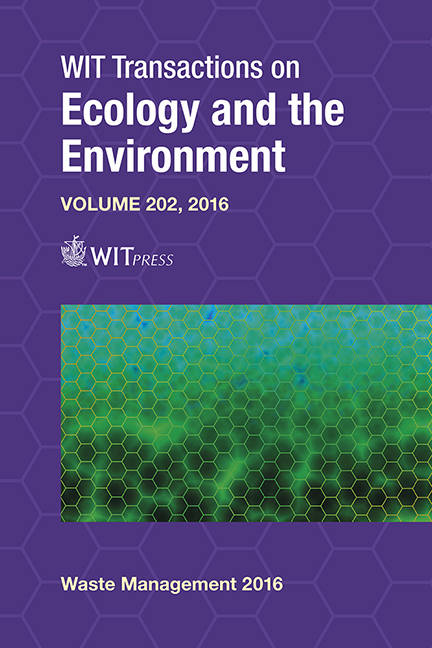An Assessment Of Crop Residue Characteristics And Factors Militating Against Efficient Management In The Ikara Local Government Area Of Kaduna State, Nigeria
Price
Free (open access)
Transaction
Volume
202
Pages
12
Page Range
333 - 344
Published
2016
Size
772 kb
Paper DOI
10.2495/WM160301
Copyright
WIT Press
Author(s)
E. I. Aruya, R. O. Yusuf, Y. O. Yusuf
Abstract
This study assessed the nature of crop residues and factors militating against its management in Ikara local government area. The ten wards in the study area were used for the study. A sample of 380 farmers was surveyed by means of a questionnaire which was administered using convenient sampling techniques based on population size. The study revealed that in Ikara LGA, Kurmin Kogi has the highest amount of crop residue with 48,328 kg amounting to 26.20% of the total crop residue generated. It was also observed that cereals contributed the highest source of crop residue with maize, millet and guinea corn as the major constituents. The study also shows that most of the farming households still engage in inefficient management practices such as open dumping and burning of their agricultural waste. However, there still exist some efficient agricultural waste management in the study area as some farmers reuse their crop remnants. Nearly one-third of the farmers reported that lack of awareness or ignorance of the benefits and strategies of crop residue management is one of the reasons for poor utilization of crop residues in the study area. The current management option is not perfect and the existing framework to ensure adequate management system and the collection facilities is not available. Crop waste is still collected without separation at the source, treatment facilities are limited and the collected waste is mostly dumped haphazardly in open areas or in most cases burnt before the next farming season. It is suggested that intensive mass literacy programmes on the economics of crop residue management be undertaken in the study area. Also, by involving the farmers and other stakeholders, the government should come up with appropriate policies and legislative measures to discourage dumping and burning of crop waste.
Keywords
waste, crop residue, management, environment, Ikara local government area





